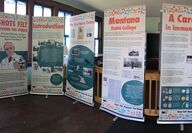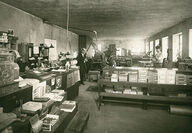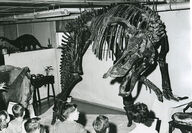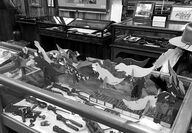Sorted by date Results 1 - 13 of 13

The Carter County Museum recently announced the opening of "Shots Felt Round the World: Maurice Hilleman and the Montana Origins of the Fight Against Pandemics" at the new Carter County Healthcare Facility. This exhibit is the first of a collaborative partnership with Dahl Memorial Healthcare Association to bring local Montana history to hospital visitors. National Rural Health Day takes place on the third Thursday of November and provides an opportunity to "Celebrate the...
Carter County Museum received a grant from the Montana Land Title Association Foundation for $1,000 this month to assist in the operation of CCM and its showcasing of the rich history of Montana. The MLTAF was formed in 1995 to support nonprofit charitable organizations, including those working for heritage preservation like local museums. The membership of the Montana Land Title Association includes over 80 members from around the state who sell “title insurance products,” for example, one-time insurance coverage that ind...

The Carter County Museum is excited to announce the debut of "Shots Felt 'Round the World: Maurice Hilleman and the Montana Origins of the Fight Against Pandemics" exhibition in the Central Schoolhouse Gallery on Main Street. Considered by many to be the father of modern vaccines, Dr. Maurice Hilleman made it his life's mission to eradicate childhood diseases. During his career, he created over 40 vaccines, including eight of the twelve commonly given to children today. He is...

The Carter County Museum will be showing two previews of the documentary film "Feek's Vision" on December 19 and 20, 2018 at 6 p.m. This footage will air during the National Finals Rodeo and the museum's showing in Ekalaka will give those who do not have a chance to get to Vegas an exclusive preview of the film. Chandler Earl "Feek" Tooke moved to Ekalaka in 1913 and began raising and training horses on the family ranch. He has been hailed as the "Henry Ford of the bucking hor...

The Carter County Geological Society will host the Montana Conversations program "Montana UFOs and Extraterrestrials" with Joan Bird on July 12. The program will be at Carter County Museum at 6 p.m. The presentation is free and open to the public; funding for the Montana Conversations program is provided by Humanities Montana through grants from the National Endowment for the Humanities, Montana's Cultural Trust and private donations. While many UFO sightings can be...

Gwenith Schultz, museum receptionist and historian completed the first phase of the Eagle Archive project on Friday, April 6, 2018. The project began in 2005 with volunteers including Jeane Koefelda. Gwen continued the work in 2008 and has been the lead staff member on the project ever since. The workflow relied heavily on the ability of the museum to fund the project throughout the years and was completed with the assistance of grants including one from the Montana Community...

On March 15 at 6 p.m. the Carter County Geological Society will host Ken Howie Studios for the annual Founder's Day Event. Dinner will be provided and the event is free and open to the public. Theresa Howie, Producer of the film, will provide updates on the Feek's Vision documentary project, including a new extended trailer of the film which will feature an interview with Director, Ken Howie. Ken will discuss the importance of the project, while sharing some items of interest...

In the interest of communicating with the community, the Carter County Museum has included a flyer in this week's Eagle to share our economic and educational impact in 2017. First, we would like to thank our visitors, donors and volunteers for helping us make 2017 a record year. Thanks to you all, we increased our attendance by 28 percent for a total of 4,895 people. Local attendance – visitors from Carter County – rose by 10 percent. Of that number, 3,444 came to the cou...

Last Wednesday, October 11, was National Fossil Day, and the Carter County Museum celebrated by inviting classes from Carter County High School. Students from the math, science, and agriculture classes spent time at the museum learning about fossil collections – following a lab plan set up by Chioko Hammel, Sharon Carroll, and Seth Whitney. This collaboration helps highlight the comprehensive nature of the collections here – not only do we have dinosaurs, but we also have an...

Over the past two months, we have had several class groups in to tour the museum. Some have traveled as far as Camp Crook and others include Baker and several grades from our own Ekalaka Elementary and high schools. For Archaeology Month, we featured our atlatl teaching collection, where students were able to use the spear thrower to hunt a mammoth and a saber-toothed cat. This month, we had the fourth grade in from Ekalaka to tour the Lambert Room and handle the Maiasaura...

The use of porcupine quills in embroidery is one of the oldest decorative traditions among American Indian tribes. The practice predates European contact by hundreds of years and was replaced gradually by glass beads brought by white traders. In the museum, we have an example of quillwork from the Sioux tribe as adornment on a pair of moccasins. Once harvested from the porcupine, quills were washed and sorted by size. Quills that are between two to three inches long are ideal...

Later this month, I will use the museum's teaching collection to conduct an atlatl training at Carter County High and Elementary schools. We sponsored a similar event last year as part of the Days of '85 celebration. However, the inspiration for including atlatls, or spear throwers, in our museum programming goes back to the excavation of Mill Iron Site. It was the late 1980s in Carter County, Montana. Archaeologists had been working for days to excavate what would become the...

April is Montana Archaeology Month, and to celebrate, the Carter County Museum will be bringing you a series of articles about topics in the field. Pottery is a relatively rare artifact to find and is often preserved in pieces called "sherds" in archaeological parlance. The museum has a small collection of a variety of sherds that have been traced back to the Mandan/Hidatsa and Crow Tribes. By examining pottery and other ceramics, archaeologists can discover information about...